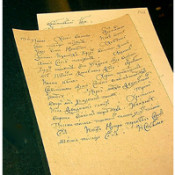
The decree “On position of informers” issued
17 (28) March 1714 Peter I issued a decree “On position of informers” which defined the powers of fiscals and procedural means of their activity.
For the first time in Russia Peter I created a body specially designed for control and supervision over law observance. It was to secretly monitor improper legal procedure and oversee compliance with the law. Later informers’ institution was transformed into the prosecutor's office.
February 22 (March 5), 1711 Peter I issued a decree on the establishment of the Senate. Decrees of 2 (13) and 5 (16) March 1711 in the Russian Empire was established informers’ office in order to secretly survey over the execution of orders by the Head of State, and in 1713 was introduced the post of general-informer.
Based on the Decree of 17 (28) March 1714 in each province of the state was established the territorial fiscal office, which consisted of four people, including provincial-informer, who oversaw the work of municipal fiscals and made an inspection once a year. In the religious sector, the informers’ organization was headed by arch-inquisitor, in the dioceses – provincial-informers, in monasteries - the inquisitors. Over time, informers were supposed to be introduced in all departments. .
Informers were to meet high professional standards. Their responsibilities included to secretly reveal, inform and expose all the abuses both of lower and high officials, to prosecute and prevent embezzlement, bribery and embezzlement by officials, as well as other crimes of anti-state and anti-social nature. "In all those cases informers should only reveal and inform, and expose in court, but without revealing themselves in any way on pain of a severe penalty, or ruin and exile... "
Informers also had to supervise the execution of the laws. They accepted denunciations of individuals, were authorized to come to all institutions, schools and other places and ask to view all the works and documents. They were always present at the removal of a money income of the state.
Informers reported to the Senate on the work done, on all that they managed to learn. If the accusation turned out to be true, then half the fine levied on the violator, went to the State, a quarter was given "to the informer, who informed on the violation”, and the rest was given to provincial-informer "for general use".
In case of incorrect denunciation the decree prescribed "... not to accuse him [a informer] (because it is impossible for him to accurately find out about everything); if all informer’s denunciations were not true, but were made by him "not for greed or malice: then make him pay a small fine, so henceforth he informed after a better investigation". For knowingly false denunciation an informer could be prosecuted.
Informer service was strictly secret, so it was very unpopular in public opinion and had little effect on the establishment of law and order. Besides informers of all ranks did not receive financial support from the treasury and made their living by "self-feeding”, which led to extortion, bribery and other abuses.
Under the decree of Peter I of 12 (23) January 1722 "On the position of the Senate" in Russia was established prosecutor’s office, a public-legal institution, a body monitoring the legality of the actions of officials and the protection of state interests, headed by Prosecutor-General. The purpose of the establishment of the prosecutor's office was the implementation of transparent monitoring of the observance of legality in the activities of central and local government bodies, prevention of crime among officials.
As prosecutorial bodies developed, the post of informers was gradually abolished.
Lit.: Копылова О. П. Прокурорский надзор. Тамбов, 2007; То же [Электронный ресурс]. URL: http://window.edu.ru/resource/844/56844/files/k_Kopqlova2.pdf; Платонова Н. В. Государственный контроль (фискалитет) в России и русское общество в первой четверти XVIII века. Автореф. дис. … к. ист. н. М., 2000; Полиевктов М. А. Проект бар. Гюйсена об учреждении в России фискал-коллегии (1713). М., 1914.
Based on the Presidential Library’s materials:
Governing Senate in the history of Russian statehood: [digital collection];
Полное собрание законов Российской империи, с 1649 года. СПб., 1830. Т. 5 (1713-1719). № 2786 С. 89;

